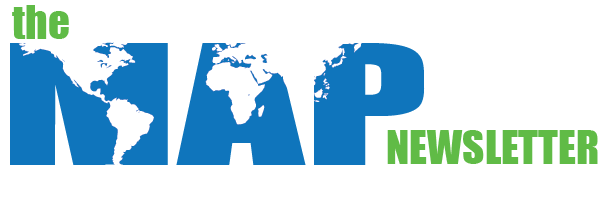Todd Parker, MedThink SciCom; Manisit Das, MedThink SciCom; Valerie Philippon, Takeda; Jennifer Ciafullo, ISMPP; Jason Gardner, CMC Connect
ISMPP consistently provides foundational educational resources for medical publication and communication professionals worldwide. To ensure alignment with the future educational needs of our members and to inform development of a longer-term, dynamic educational plan, the ISMPP Education Task Force launched a needs assessment survey in Q1 2021. There were 430 responses (~25% response rate), with representation from across the United States, Europe, and the Asia-Pacific region.
Respondents were asked to identify the top 5 focus areas for which they would like to receive educational content from ISMPP. The highest priority focus areas included digital solutions, communication strategy, publications, patient resources, and professional development (Figure 1). Respondents also indicated their preferences for delivery formats. Generally, webinars were the most preferred format, followed by live presentations and articles. However, format preferences varied based on type of educational content (eg, live presentations and case studies for digital solutions vs articles and position statements for compliance-related content).
Figure 1. Prioritized Educational Focus Areas: Proportion of Respondents Identifying Focus Area in Their Top 5 Priorities

Most Important Focus Area: Digital Solutions
Digital solutions received more interest than any other focus area, with 71% of respondents including it in their top 5. Specific suggestions from the respondents in this category included improving digital strategy, highlighting best practices for digital publication enhancements, discussions of continued evolution of healthcare platforms, and optimizing visual communication in a changing environment (Figure 2).
Figure 2. Suggestions for Topics of Interest Within Digital Solutions Focus Area

Communication Strategy and Publication Needs Included Both 101 and 201 Topics
Of those who identified communication strategy as a focus area of interest, survey respondents expressed a need for educational content on emerging topics, including identifying needs across stakeholders, aligning across internal teams, strategizing throughout all the phases of a product’s life cycle, and determining best practices for developing scientific platforms and lexicons. Of those who identified publications as a focus area of interest, the respondents’ needs were diverse, reflecting differences in educational requirements across members (Figure 3). Some members expressed a need for introductory content on manuscript development, authorship issues, and best practices for publishing clinical data; whereas others indicated a need for content on emerging publications topics, such as GPP4 updates, data dissemination in virtual settings, and metrics that support value to leadership. Respondents also expressed interest in learning more about publishers through their sharing of policy updates, best practice case studies, and evolving journal formatting requirements.
Figure 3. Suggestions for Topics of Interest Within Publications Focus Area

Patient Resources Continue to be a Key Topic of Interest
There is continued interest in partnering with patients (Figure 4), including education on how best to do so (eg, incorporating patient insights into strategy, providing virtual opportunities for patient engagement) or how to enhance patient engagement skills (eg, involving patients as authors, tailoring scientific content for patients). Additionally, members continue to seek patient insight on content format preferences and best practices for developing plain-language summaries, including metrics for assessing their value.
Figure 4. Suggestions for Topics of Interest Within Patient Resources Focus Area

Investing in Ourselves Is Also an Important Educational Goal
Professional development was another key focus area for which respondents expressed a desire for more content (Figure 5). Respondents indicated they want to learn more about career trajectories and the pathways available to them, particularly career development in medical publications, and medical affairs more broadly. They also expressed interest in content that would grow technical skills and ensure they stay abreast of the latest industry developments.
Figure 5. Suggestions for Topics of Interest Within Professional Development Focus Area

Other Insights
Several respondents highlighted their appreciation of educational tracks curated by topics and level of experience. Many respondents identified a need for standardized templates for publication policies/SOPs, publication plans, lexicons, scientific platforms, and workshops. Members also provided feedback on timing for live virtual learning sessions. Although a few indicated a preferred day of the week, time of day was considered important, with some suggesting lunch hour as optimal, whereas others indicated a preference for on-demand content, allowing them to watch when most convenient and at their own pace. Members from the Asia-Pacific region indicated that live sessions should be held at a convenient time for them. Often watching live sessions is difficult for those in the Asia-Pacific region as the difference in time zones means these sessions take place late at night. These members also highlighted a need for more Asia-Pacific region–based ISMPP U webinars and self-paced study materials.
Overall, the results from the ISMPP educational survey affirm that our members are a diverse cohort of professionals with unique needs. They are highly engaged and willing to take time to help identify the future needs of the organization. Topics of interest identified across each focus area and regional prioritization of content needs have been used to develop content plans for the ISMPP Annual Meeting, ISMPP Asia Pacific Meeting, ISMPP West, and ISMPP European Meeting, as well as to feed ideas into other education channels, such as ISMPP U webinars and The MAP newsletter. We look forward to leveraging these learnings from the survey to formulate a dynamic educational plan that will continue to support your professional needs. A sincere thank you to all the ISMPP members who participated in the survey.

